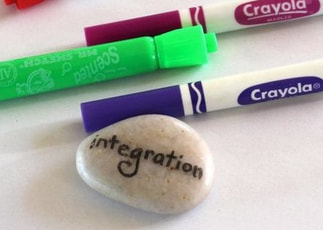 In another blog post I talked about my role as an integrator. My work as a scholar-practitioner has been grounded in evolutionary systems theory, transformative learning, and systemic action-research. My most creative contributions to organizations come from my ability to question and expand perceived boundaries and from connecting seemingly unrelated “dots.” In other words, my work is about innovation as in the creation of new possibilities from the integration of disparate dimensions. I do a lot of work with social entrepreneurs: individuals committed to create social enterprises (for-profit, non-profit or a combination) that combines best business practices with values-based leadership, and with a commitment to the triple bottom line (people, planet and profit) or some other expanded metric for socio-ecological value and corporate responsibility. Over the years of supporting many individuals with the passion and courage to create social enterprises, I have noticed that the field of social entrepreneurship still embraces an old assumption: the enterprise depends on the passion and capacities of the individual leader as a “hero.” As a result, social enterprises can be strongly associated with the ego and identity of the individual entrepreneur. The failure or success of the enterprise depends on his or her capacity to overcome the enormous challenges of a new venture. After a few decades of definition and growth of the social entrepreneurship field, we are starting to perceive some of its limitations. Two that come to mind are relatively the narrow focus of social enterprises and the lack of collaboration among social entrepreneurs/enterprises – both derived from the financial pressure, competitive landscape and other practicalities of running a successful business. So the solution to world hunger gets reduced to a protein bar for an African country, or the solution to climate change would seem to depend on one (brilliant) patented new technology. The combination of these two limitations, in my opinion, have prevented a deeper and faster positive impact in the world. The good news is that every day there are more and more entrepreneurs who want to live their values and create good for the world. We are starting to see a more systemic approach to entrepreneurship: cultural entrepreneurship. Curtney Martin and Lisa Witter distinguished cultural from social entrepreneurship by pointing out that cultural entrepreneurship disrupts belief systems. I would add that cultural entrepreneurs recognize the complexity of systemic global problems. Cultural entrepreneurs are more interested in addressing the paradigmatic changes that need to occur to reinvent society. Their work contributes to a shift in consciousness, not only in behaviors. They recognize that they cannot solve these problems alone, so there is an awareness for the need of collaboration. I was interviewed by Saybrook graduate Ani Davidsen. She has a radio show called “Legacy of Change” which covers diverse topics about social change. In my conversation with her, I talked about my work as a social and cultural entrepreneur and the role of personal development and collaboration. You can listen to the interview here.
0 Comments
Leave a Reply. |
AuthorKathia Castro Laszlo, Ph.D. Archives
August 2015
Categories
All
|

 RSS Feed
RSS Feed